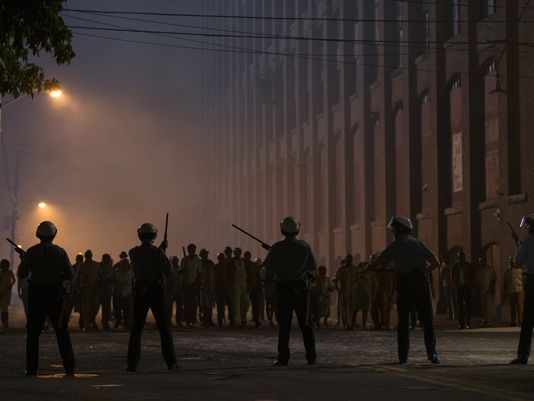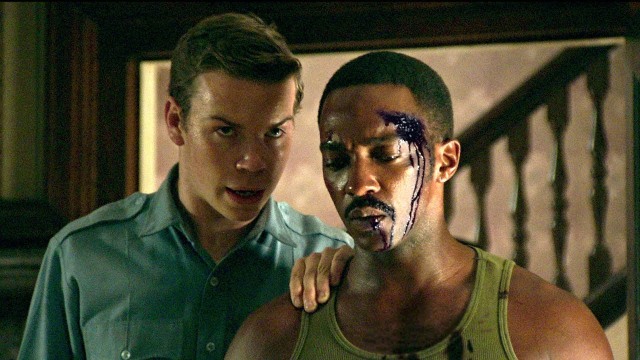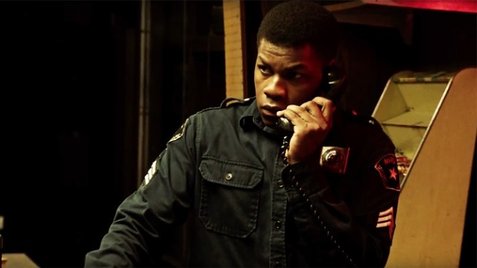
A boiling point summer in American race relations becomes a tipping point in American history in “Detroit,” Kathryn Bigelow and Mark Boal’s incendiary epic about the 1967 riots that reveal so much about the country we live in today.
The “Hurt Locker/Zero Dark Thirty” team take us into a horrific, harrowing and signal event in those riots — police rounding up, terrorizing and executing suspects in the Algiers Motel — and shock us with its brutality. But the shock really comes in how little we’re amazed by what we see — out-of-control, racist, self-preserving cops, victims with so little faith in the police or the system that simple mistrust spirals into murderous police reprisals that stain race relations and police misconduct to this very day.
And if Bigelow cannot quite bring herself to gracefully end her difficult, challenging movie — which changed studios and finds itself parked in theaters on the tail end of popcorn picture season — it’s because it’s too important a subject to risk shortchanging, too pointed a message to risk letting audiences miss.

Will Poulter (“The Revenant”) gives a break-out performance as Krauss (his real name was Senak), a young officer we meet, packed into a patrol car days into the riots that began after a police raid on an unlicensed after-hours club. Krauss pays wonderful lip service to the tragedy they see unfolding, the injustice that led to it.
Then he and two comrades charge into the fray and he shotguns a young looter running away with two bags of groceries.
The horrors have only begun.
John Boyega (“Star Wars: The Force Awakens”) gives the other stand-out performance. Melvin Dismukes is an upstanding citizen, a responsible, works-two-jobs private security guard hired to protect a store, a conciliator eager to placate police and National Guard troops called in to keep the peace, to save black lives that fall under their gaze and into their custody.
And his reward? Being called “Uncle Tom” by his fellow young black men.

Dismukes is also there as surrogate and conscience of the audience. He will bear witness to the police assault on a cheap hotel where an insanely ill-timed prank — firing a blank-gun starter pistol out the window at cops and Guardsmen — leads to the tragedy.
Frazzled, embattled names-changed-for-the-movie police (Poulter, Jack Reynor, Ben O’Toole) round up half a dozen black men and two ahead-of-the-tolerance-curve young out-of-town white women (Hannah Murray, Kaitlyn Dever) and demand to know who the “sniper” was.
A host of the party they were attending is dead, having bled-out from a shotgun blast in the next room. And these Detroit cops, with rattled National Guardsmen looking on (the State Police want nothing to do with it) are hell-bent on getting a suspect, finding the gun and justifying their actions — by any means necessary.
The racially-mixing young people push the cops’ racial hot-buttons, which connect to their itchy trigger fingers.
Bigelow stages this nightmarish scene as the ever-darker climax of the movie. And just when you think it and the movie are over…
Dizzying, hand-held cameras immerse us in the riots, snippets of news footage and TV commentaries of the day give the “war zone” and “How could this be happening in America?” take.
And we also meet young people, in near-clueless denial, trying to experience “normal” — a singing group, The Dramatics, and their lead-singer, Larry Cleveland (Algee Smith) brace to take the stage at the soul music revue that could be their big break when curfew closes the Fox Theatre.
Larry Cleveland and his friend Fred (Jacob Latimore) take refuge by checking into the Algiers, where kids, out-of-town visitors and a freshly-returned-from-Vietnam vet (Anthony Mackie) party like it’s 1967.
Music — pointed, on the nose and yet lightly sampled — underscores the tension — “Nowhere to Run,” “Get Ready.”
Like “Zero Dark Thirty,” “Detroit” is a swirling, quick-sketch impression of events and largely unidentified people. John Krasinski plays the baiting defense lawyer for the cops, young Congressman John Conyers (Laz Alonzo) works the streets trying to calm the crowds and an Adam Clayton Powell figure (also a Congressman, then) expresses outrage.
If you know the history, you will be rattled remembering how bad things were, and how much worse things can get when people are harassed out of any hope that things will change.
And if you don’t recall that history, you will be stunned at how much has changed, and how little. A film this intense, this sharp in its criticism and this damning in its evidence (some of which is in dispute) could be instructive and healing, if only the right people would see it.
Maybe the most sickening closing thought of all is that fifty years after the events depicted, released in summer blockbuster season, that’s the one way “Detroit” is sure to come up short.

MPAA Rating: R for strong violence and pervasive language |
Cast: John Boyega, Will Poulter, Anthony Mackie, Algee Smith, Hannah Murray, John Krasinski, Jennifer Ehle
Credits:Directed by Kathryn Bigelow, script by Mark Boal. An Annapurna release.
Running time: 2:23

I liked it but, I felt like some of these big name actors were wasting in these roles. Such as John Boyega and Anthony Mackie. Also it’s a little disjointed imo!